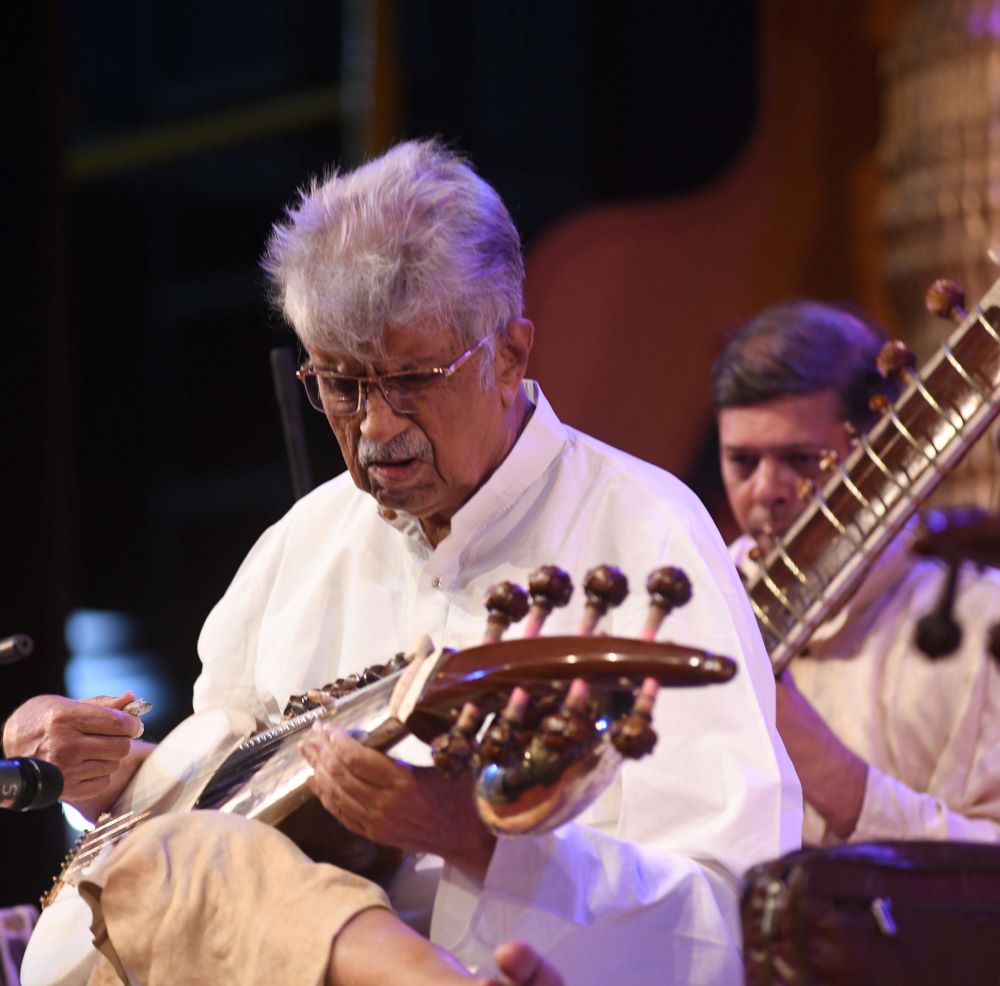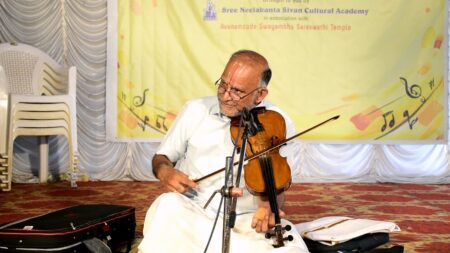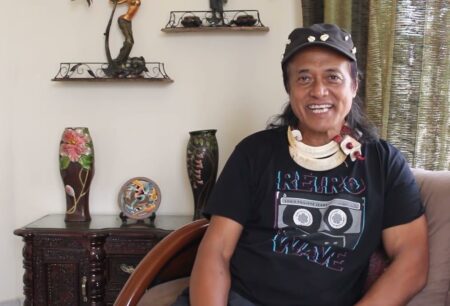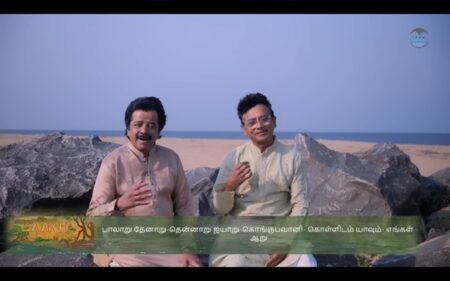The author, director of the documentary Pandit Rajeev Taranath – A Life in Music, reflects on the musician’s warmth, compassion, and deep connection to music on his 92nd birth anniversary today, the first since his demise four months ago, with celebrations set for the 19th at Kalakshetra, Bangalore.
When the famous sarod maestro Rajeev Taranath was eight or nine years old, he had in his possession a camera that took true pictures. He was allowed to play with it and amuse himself. He made his father and friends pose for him. They obliged him and dutifully stood in a row posing for the great group photo. However, for some reason known only to boy Rajeev, he kept walking backwards even when all of them were clearly visible through the view finder. He stopped in his tracks suddenly.
The family pet dog which was running behind him decided to get into the frame now. With the dog in the foreground and all the adults in the background, he clicked the perfect picture. He could not imagine the group photo without that pet. The dog was a part of this circle of loved ones. Canine or human, all those he cared for were included in this cherished circle of family and friends. This is the kind of warmth, humanity, and love for people and animals that he showed all through his long life.
Rajeev Taranth’s father Pandit Taranath, a Konkan and his mother Sumathi Bai, a Tamil were highly progressive in their outlook on life. He learnt music from his father and developed an interest in literature since his mother was a teacher and writer on women issues. He learnt singing and played the tabla. The epiphanic moment that made Rajeevji choose sarod as his musical instrument and accept Ustad Ali Akbar Khan as his guru is narrated by him on numerous occasions.
A compassionate humanitarian and a modest intellectual
When Khan Saab departed to United States, Rajeevji took on teaching assignments as English professor and served in many places including Trichy. This is where I got my first introduction to him. Being a cineaste, I looked at him with particular attention as he was the music director of the path-breaking new wave Kannada film Samskara. In those days, it made big news as a parallel film in Kannada. It was praised for its unique music direction. Being with him and interacting with him over years led me to realise what a liberal-minded intellectual and loving human being he was.
He was extremely warm towards anyone who approached him. He never made anyone feel inferior or small in his presence. This attitude drew people from all walks of life towards him. On one occasion, the college principal confronted Rajeevji for allowing a watchman to sit in front of him in his room. Rajeevji made it clear that his act did not in any way harm the institution’s decorum. “He was sitting since he wasn’t standing,” was his repartee casually thrown at this hide-bound principal.

Later, I started making films in Chennai. Rajeevji spent most of his time abroad teaching music and giving concerts. Our meetings were few and far between. But whenever we met, he always asked me jokingly, “When are you going to make a film on me?” Though our life situations and the distance made it hard to embark on a film project, I kept track of his achievements.
In addition to these excellent achievements in his musical, literary, and even film career, it was his humanitarian attitude that drew me to him most. For instance, in the aftermath of Gujarat riots, many teenagers of the minority community fled to Bangalore and sold cotton kurtas to eke out a living. They took shelter on railway platforms sometimes. After buying their kurtas as much as he could, he sought their forgiveness with folded hands for not being able to protect them from the atrocities they were subjected to. He contacted all his friends and acquaintances and urged them to buy from these young men who were trying to rebuild their lives.
Dedication to music till the end
Sometime later, during the outbreak of the COVID epidemic, my friend Victor Albert stepped in as producer for my films. I met Rajeevji in Mysore and broached the matter of making a documentary on him. He welcomed the approach I planned to take in making the documentary.
With deep enthusiasm, he gave a lot of firsthand information I needed. He also put me in contact with his colleagues, friends and students to get further details. I was flooded with his recordings, videos, photos and other materials from hundreds of friends, well-wishers, and admirers. That was also the time when I kept listening to his music all through. I could sense it penetrate deep into my consciousness. I felt his presence in myself through his music soaking into my mind. What loads of mere information from outside could not do, his music did.
This is what defined my final concept and shaped my vision for the film Halfway into its making, I suddenly decided that my documentary would not strive to cover his long and eventful life in every detail. But I wanted to focus on his music. I did not tell Rajeevji of my decision. I am sure he sensed the direction it was heading. Perhaps, that also made his cooperation total.
Rajeev Taranath never questioned my decisions during the filming. I faced difficulty only when I insisted on filming his riyaz sessions. His riyaz was a private affair and not like a public concert. But finally, he gave in to my demand and performed it after one round of practice. A riyaz after riyaz. After finishing the film, I announced its title. “Pandit Rajeev Taranath – A Life in Music.” As I expected, he appreciated it with a broad smile.
The documentary was premiered on his 90th birthday celebrations in a huge auditorium with more than three hundred people in the audience. Rajeevji sat with the audience and saw it for the first time. After the show, I went upto him to see his response. I was a little anxious too. He patted my back and said, “excellent,” to my great relief and joy. Since then, I have shown the 40-minute documentary to appreciative audiences in several important venues across India.
I met Rajeevji in his last days at the hospital in Mysore. He was aware of his condition after a fall. But he continued to sing and teach music to his students who came to comfort him even in the hospital. It was as if he had shifted his classroom from his residence to the hospital.
Rajeev Taranath was inseparable from his music. He belonged to senia Maihar-Allaudin gharana that had its origins in Saraswati, the musical genius and daughter of the legendary Tansen. However, Rajeevji did not talk about any divinity as the source of his music. For him, music also embodied the humane, rational and aesthetic values he strongly believed in.
“To which gharana does God belong?” he quipped during a lecture on music.
On the 19th of this month, Pt Rajeev Taranathji’s birthday celebrations are being organized in Kalakshetra, Bangalore. The event features talks by major literary figures and musicians. As a part of these celebrations, there will also be a Hindustani vocal concert by Pt Venkatesh Kumar. This event is organized by Pt Rajeev Taranath Memorial Trust in collaboration with the Karnataka Sahitya Akademi, Bangalore.




